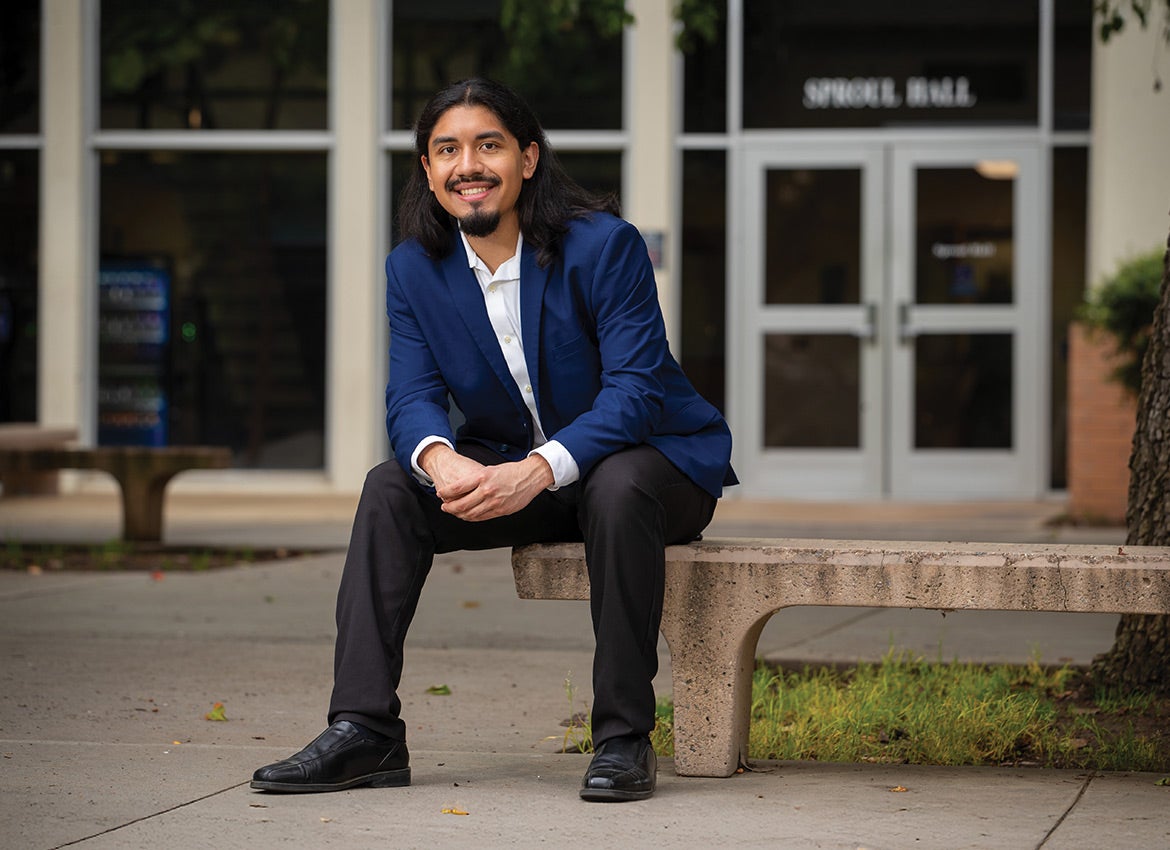Front and Center
First-generation student Ulises Mata shares how he charted a pathway to educational success
By Imran Ghori | Photo by Stan Lim
A s a UC Riverside undergraduate, Ulises Mata has learned to put himself out there to get the most out of his education. A fourth-year student double majoring in education and psychology, he has compiled an impressive list of academic achievements: making the Dean’s Honor List, earning a Chancellor’s Research Fellowship, and being admitted to the University Honors program. He’s also served as a peer mentor for first-year and transfer students at the Academic Resource Center.
“You have to see yourself in these spaces as capable and able,” he said. “Sit in the front of the class because you want to build a connection with the professor. If you go up to them before class, after class, or during office hours, you’re going to find yourself with more opportunities.”
This mindset is what helped Mata earn a research position in the lab of assistant psychology professor Diamond Bravo — an opportunity that is shaping his future career path. In Bravo’s Cultural Resiliency & Motivation Lab, her team explores motivation among ethnically and racially minoritized populations with the aim of enhancing academic curricula and informing public policy. Working with Bravo has had a profound impact on Mata, he said, as she is the first Latina professor he had as an instructor and shares a similar background.
A first-generation student with immigrant parents from Mexico, Mata grew up in Lomita, a small city in south Los Angeles County. Lacking permanent legal status, his father found it hard to find steady employment, Mata said. His mother worked long hours at an airplane parts factory, starting her shift at 4 a.m. and coming home in the afternoon to take Mata and his brother to baseball or taekwondo practice.
“She was like a supermom,” he said. “She would take care of us and work at the same time.”
Mata, whose older brother attended community college, always intended to pursue higher education after high school. He applied and was accepted to four Cal State and three UC campuses, including UCR, which he ultimately decided on. He submitted his intent to register, but in spring 2020 the COVID-19 pandemic began and his high school was forced to switch to remote instruction during his last semester.
“I didn’t want to start higher education online,” he said. “It just wasn’t something I enjoyed or felt that I could thrive in at the time.”
Mata had been working a part-time job at Popeyes Louisiana Kitchen at the time and decided to take a year off from school to work full time at the fast-food chain. A few months later, he was contacted by a UCR academic advisor checking on his registration status. He told the advisor he was taking a gap year but made sure to ask how he could reapply the next academic year.
The following spring, UCR was one of only two campuses Mata considered. He once again chose UCR, this time due to its financial aid support and because he had high school classmates who had enrolled the previous fall. He roomed with one of his former classmates, using the money he had saved up from his Popeyes job.
Many classes were still hybrid when he began in fall 2021, which Mata found challenging, but he credits his friend and fellow UCR student Piolo Ignacio with helping him keep organized to better handle remote learning. Mata was taking introductory and breadth classes as he tried to figure out his major when he enrolled in a psychology course titled “Healthcare Communication” during his first quarter.
“I ended up realizing psychology is not necessarily about being a doctor, being a nurse, being a practitioner,” he said. “It is more about the relationship between a patient and a physician, and why mutual understanding of each other’s values and beliefs are very important, so you can create healthy communication.”
Mata eventually narrowed his interest to developmental psychology after taking Bravo’s course and joining her lab. His area of research centers on identity development, raciolinguistics (the study of the relationship between race and language), and the experiences of the Hispanic/Latinx community in education — a focus that led him to add education as a second major.
Studying these subjects also helped provide context to his own experience in second grade as an English as a Second Language student. Mata recalled how he didn’t want to speak Spanish growing up because he was in a program that undermined his bilingual identity by focusing only on testing his English development while dismissing his Spanish language skills. This experience sparked his interest in studying the coping strategies of students experiencing ethnic and racial microaggressions and the role they play in identity development.
Mata, who will be graduating in June, plans to continue his research while pursuing a doctoral degree in human development at the University of Rochester Warner School of Education. With the long-term goal of becoming a professor, he wants to help support first-generation and low-income students by creating programs geared to their needs. Despite a heavy load of commitments — tracked with his color-coded Google calendar on his smart phone — and ambitious goals for the future, Mata noted the importance of maintaining physical and mental health and the role of social support in his academic success.
“I’m an ambitious student, but the encouragement from family, friends, and mentors is what’s continuing to help me,” he said. “These relationships help build my confidence in myself to want to do all these things.”
Together with your philanthropic support, we can propel tomorrow’s artists, engineers, entrepreneurs, educators, physicians, policymakers, scientists, and leaders into their bold, brilliant futures. Give to student scholarships today at donate.ucr.edu/spring2025.
